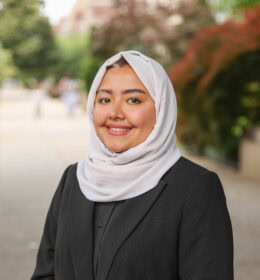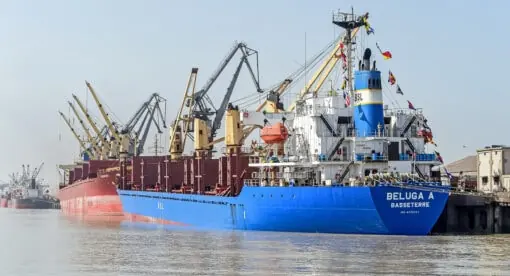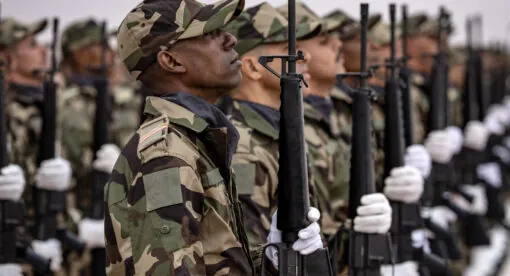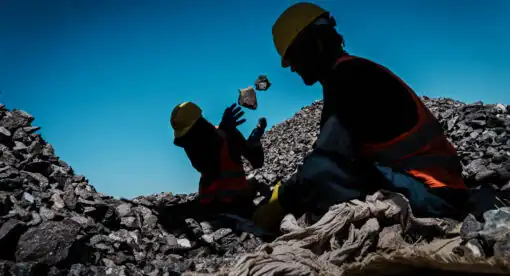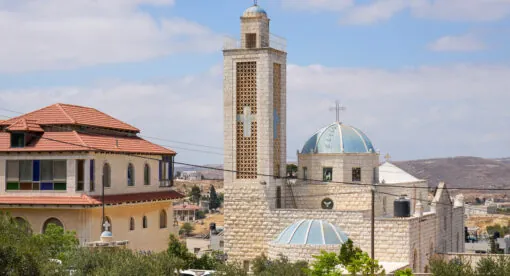In this episode of the Contours Podcast, host Eugene Chausovsky talks with New Lines researcher Shahad Turkistani about the central role Saudi Arabia plays in the global energy picture, the future of the kingdom’s renewable energy diversification efforts, and how the country factors into U.S.-China competition.
Eugene Chausovsky:
Hello everyone, and thank you for joining us for the New Lines Institute for Strategy and Policy Contours podcast series. I’m your host for today, Eugene Chausovsky, and I’ll be talking to Shahad Turkistani, a research analyst for New Lines Global Energy Connectivity program, about the role of Saudi Arabia in global energy and implications well beyond. In addition to her role at New Lines, Shahad is also pursuing a Ph.D. at Johns Hopkins University School of Advanced International Studies, where she focuses on Asian energy security. She’s also an associate researcher at the Rush Hour Center for East Asian Studies, where she researches topics pertaining to energy security, Asia/Middle East relations, and East Asian foreign policy. Shahad, welcome to the show.
Shahad Turkistani:
Thank you so much, Eugene. And thank you for having me today, and for dedicating actually this episode on Saudi Arabia, and the topic which I think is very timely, given Saudi Arabia’s pivotal role in the global energy map.
Eugene Chausovsky:
Yeah, absolutely. So speaking of that, I’d like to start off by discussing just as you said, Shahad, the importance of Saudi Arabia in the global energy sphere, in particular as one of the world’s leading oil and natural gas producers and exporters. So, can you maybe start off by providing some context on Saudi Arabia’s significance in this regard?
Shahad Turkistani:
Yes, absolutely. So I think to answer your question, the first thing that comes to mind is that the way I look at this is that Saudi Arabia’s importance stems from three main points, especially in the energy sphere like you mentioned. The first one is strategic location, second is energy capacity and natural resources, and of course the global economic heft that Saudi Arabia plays globally and regionally as well. So, in terms of location, we know that the audience, are of course, know that Saudi Arabia borders, the Red Sea to the west and Arabian Gulf to the east. So this strategic location gives access to two important waterways, which is the Strait of Hormuz and the Bab-el-Mandeb Strait. And of course both are very vital for energy transit and trade. Straight of Hormuz connects Europe with Asia, and the Middle East with the global export market, and it transits from around 20 to 30% of the world’s oil.
So within that, the kingdom actually export around 88% of its oil production through the Strait of Hormuz. So, it’s really safe to say that the Strait of Hormuz is the lifeline for the Saudi economy, but not only for the Saudi economy, but also for big oil importers like China and Japan, who highly depends on the Strait. Similarly, Bab-el-Mandeb constitutes a special importance of course, maybe to Europe, as oil tankers pass through the Strait, all the way to the Suez Canal and then to the European markets. So Saudi Arabia have always realized a strategic location and capitalize on it, and even more now with Vision 2030. The second point is energy capacity. So Saudi Arabia, as we all know, possess the second-largest proven oil reserves globally, estimated at approximately 267 billion barrels, if I’m not mistaken. And of course, it’s one of the top producers and exporters of crude oil.
This is also coupled with the important role the country plays in OPEC, to stabilize the energy market and overcome its challenges. Another point, of course, is the competitive advantage the country has in terms of production cost. So as of recent studies, the average cost of production, according to Aramco, is less than $10 per barrel. So of course this is due mainly to efficient extraction methods and other things. And last but not least, all these factors have enabled Saudi Arabia to be a pivotal player, regionally and globally, as well as we know that the availability of natural resources doesn’t directly influence economic development, but stronger governance and management of these resources is what matters. And this is what Saudi Arabia have of course succeeded in doing over the years. So the economic heft of the country doesn’t just come from its energy importance globally, but also the important role it plays in the Islamic world and the Arab world as well. I hope that answers your questions.
Eugene Chausovsky:
Yeah, no, absolutely. Thank you, Shahad. So yeah, you touch on a lot of really interesting and important points there in terms of not only Saudi Arabia’s immense energy capacity, but also its role within OPEC and shaping global markets, especially when it comes to oil. But as we all know right now, the climate transition is one of the key topics around the world. So I’d like to shift maybe briefly to Saudi Arabia’s role. I think people may not be as familiar, in terms of the global energy transition and the role that Saudi plays there, as they are with its role in fossil fuels. So as part of the world’s efforts to meet the challenges of climate change, we’ve seen that Saudi Arabia has, in recent years, made some significant efforts and has even greater ambitions of diversification from a fossil fuel-dominant economy, especially in when you briefly touched on this, under its Vision 2030 program. So can you maybe unpack that a little bit for us?
Shahad Turkistani:
Yeah, of course. As we all know that the main pillars of energy security are affordability, reliability, and accessibility. Recently a new element has been added, which is of course diversity. Eighty-six years after the first discovery of oil in Saudi Arabia, the country is now producing affordable energy, becoming a reliable partner globally and have access to, just like we talked earlier, to energy. The only thing that was actually missing from the equation was diversity, and that’s what Vision 2030 came to complement. So for an economy that is heavily dependent on one commodity, which is oil, so the country was basically asking, how can we diversify our energy mix to ensure long-term sustainability and improve our economy at the same time? So, this is actually the crux of the Vision 2030 that you were asking about. And under the vision, the country plans to invest in three main spheres when it comes to energy transition.
One is carbon circular economy, which is a program for carbon capture and storage. There’s also the Saudi Arabian energy efficiency program, as it’s called, which is an initiative to increase energy efficiency. And then of course lastly, investment in the new energy sources. Ever since the establishment of Vision 2030, back in 2016, the Saudi Public Investment Fund, PIF, has invested around 400 billion US dollar, in alternative energy, including hydrogen and other renewable energy sources. So, just like you mentioned, Eugene, the goal here is to diversify away from fossil fuel and to achieve that, the country aims to generate at least 50% of its energy from renewable sources by 2030, which intends to reduce reliance on oil revenues, particularly, and increase the growth of non-oil sectors. And the remaining 50% is expected to come from gas, which is also something the country is now working on exporting. And then Saudi Arabia also aims to reduce its projected 2030 emissions by more than 130 million tons, and lessen its contribution to global emissions. So all these things are actually evident of the direction in which the Saudi government is taking to achieve its either carbon neutrality by 2060, or even to 50% of its energy mix from renewable by 2030.
Eugene Chausovsky:
Great, thanks Shahad. So one follow up to that, because you mentioned the investment that Saudi has been placing into new energy sources, and $400 billion, that’s quite a stark amount. You mentioned hydrogen renewables like solar and wind. Are there any particular areas beyond the home front that Saudi has been looking at around the world? I know for example, Central Asia has been a region that Saudi has been involved in with some solar projects, Asia-Pacific as well. Anything that particularly stands out to you in that regard?
Shahad Turkistani:
Of course. I mean, the energy partners of Saudi Arabia, like let’s say China and Japan or even South Korea, the relationship maybe started with oil but is now actually expanding to include renewable energy. And Saudi Arabia has worked with these countries, and I mentioned these three countries because I mainly work on them, but they have worked together with, let’s say China, to develop renewable energy projects within Saudi Arabia. So for example, under the Vision 2030, they initially targeted 9.5 gigawatt of green energy by 2030, but this was revised in 2023 based on the market demands. Now it’s down to 130 gigawatt. So to meet these kinds of goals, Saudi Arabia have worked with Chinese companies, Japanese companies, to welcome green technology export to the region. And maybe an example of that is, Saudi Arabia’s actually already started generating wind power since 2022, when it connected to the Dumat Al-Jandal wind farm, operated by the UAE Masdar.
Eugene Chausovsky:
Great, thanks so much. So in addition to making significant investments, as you mentioned in green energy projects like solar and wind, we know that Saudi Arabia has also had discussions of actually launching a civil nuclear program with the assistance of the U.S. And in fact, this is a major component of a broader potential agreement that has been long been discussed, that includes normalization of diplomatic ties with Israel. But as we know, that has seen some significant challenges recently due to Israel’s war in Gaza, and I think this really reflects how closely the worlds of energy and geopolitics intersect. So I’m curious, what do you see as the prospect for such a civilian nuclear program between the U.S. and Saudi Arabia, moving forward?
Shahad Turkistani:
Well, to answer your question very direct. The prospect is enormous and just like mentioned last year, in a statement by his Royal Highness Prince Abdulaziz bin Salman, I believe it was in one of the IAEA’s conference, when he showed the interest publicly, showed the interest of Saudi Arabia in acquiring the peaceful nuclear energy technology and built its first nuclear energy power plant in the kingdom. So this of course will help meet the sustainable development requirements as outlined in the Saudi Vision 2030, just like we were discussing now. And this of course will be according to both local requirements and international commitments, and here comes the role of the United States. Of course the United States is leading when it comes to nuclear energy technologies, and having this trusted and strong partnership between the two countries, makes it even more important to cooperate in this front. So just like I said, the prospect is enormous, especially the other country has showed a huge portfolio of uranium, in which it plans to use it, especially the domestically sourced uranium to build its nuclear industry.
So they have the capacity to do so. I remember we were talking about this the other day, about the SMRs or the small modular reactors, which have me thinking that it would be ideal to be used in Saudi Arabia, maybe in the deserts or isolated spaces, as it’s more flexible to deal with and it’s also faster to build. But regarding the normalization with Israel, I’m not following this topic very closely, but I think the talks has started even before October 7th. And just like you mentioned in your article that was published yesterday, the Saudis have made it very clear that they’re not interested in pursuing any normalization, unless a credible and irreversible path to Palestinian state is ensured. And of course, that starts with cease-fire, but whether the U.S. and Saudi Arabia would reach a deal, and in fact the Saudis would like to reach a deal with the US, potentially without involving Israel in the discussion. But if that would to happen, it would allow the Saudi to acquire the U.S. technology, which I think will be very… will have a huge prospect for the energy diversity goals in Saudi Arabia. But this is something we need to watch out for in the coming months and how it develops between the three countries.
Eugene Chausovsky:
Yeah, absolutely. I think as you mentioned Shahad, one really interesting dynamic that’s emerged is because of the geopolitical complications, if you will, related to the Israel-Gaza conflict. It’s become clear that the tripartite deal between the U.S., Israel and Saudi Arabia, that now the prospects are looking more challenging, just depending on how the situation unfolds on the ground. But we’ve seen both the Saudis and the U.S. give indications that they still want to move forward with their components of an agreement, namely the nuclear agreement, as well as some enhancement of security ties bilaterally between the U.S. and Saudi Arabia. So that will be really interesting to watch moving forward, as you mentioned. And speaking of energy and geopolitics, we also know that Saudi Arabia has played an important role in the strategic competition between the U.S. and China, as it has significant energy and economic relationship with both countries, and you’ve already touched on the Chinese element a little bit earlier. So I’m curious maybe to wrap up here, what are some of the key aspects of this competition and how do you see it moving forward from an energy perspective?
Shahad Turkistani:
Yes, Eugene, this is a very important question. And one thing for sure, just like any other country actually, Saudi Arabia doesn’t want to have to choose between the United States and China. They don’t see the relationship from a zero-sum game perspective. And in fact, they enjoy strong and strategic relationship with both countries, and they’re very keen to diversify their relationships. So while the relationship with the United States is mainly security, just like you mentioned, the relationship with China is more economic. Saudi Arabia, of course, is one of the largest military spenders in the world, and the United States is the largest provider of weapons, accounting for 75% of Saudi Arabia’s imports. So this is not a small deal to Saudi Arabia. The relationship between the two countries is historic. It’s very strategic, and it’s almost 90 years old now. So it’s no doubt that the Saudi government see the U.S. as a valuable, if not the most valuable partner.
But again, the dynamic of the relationship with China is a little bit more, maybe more economic. At the end of the day, China is the GCC’s biggest trading partner. The trade volume between Saudi Arabia and China was around $100 billion in 2022. So this reflects the strength of the strategic economic partnership, and many trade and investment opportunities that is to take part between the two countries. But maybe more importantly, China of course is the biggest oil importer of Saudi oil. Almost 34% of Chinese imported oil comes from Saudi Arabia. And almost the entirety of it transited through the Strait of Hormuz, just like we discussed all the way to the Malacca Strait, and then to the Chinese market. As well as of course, oil and gas demand is yet to peak in China. So this energy or oil relationship between the two countries, is about to continue even in the future.
But the scope of cooperation even extend beyond fossil fuel. And maybe I already alluded to this, but the renewable energy projects such as the export of green technology is highly welcomed in the country as well. In addition to, of course, the recent role that the Chinese has been playing in the Middle East, which is the mediation efforts in some conflicts and maybe the most importantly, and recently, is the Saudi-Iran deal that China was able to broker, in restoration of the relationship between the two countries. So overall, I think the Saudi government would want to work with both, the United States and China, and not wanting to be in the middle and having to choose sides. But honestly speaking, in my opinion, I think the Saudis can even play a bigger role in converging views between Washington and Beijing if needed.
Eugene Chausovsky:
Yeah, that’s quite interesting. Thank you, Shahad. I mean, there’s a lot to unpack with what you’ve mentioned there. As you said that China, there’s an immense energy relationship between China and Saudi Arabia. With Saudi Arabia being one of the biggest sources of oil for China and the Strait of Hormuz being a key sort of waterway, and especially as we’re watching the events in the Middle East, particularly Israel and Gaza, but also the if ripple effects unfold. We’ll have to watch really closely, if and how, that could impact the Strait of Hormuz because we’ve already seen some disruptions in the Red Sea, and potentially if things escalate, that could have some significant impact on Saudi Arabia, on China and a lot of those other countries. So that’s definitely something to watch for. But you’ve also mentioned the export of green technology, so it goes way beyond fossil fuels as well. And then China’s efforts to basically increase its diplomatic presence, its mediation efforts.
You mentioned the Saudi-Iran normalization deal. China has more recently been active on the Israel-Palestine front as well. So, there’s a lot of interesting and overlapping dynamics, even as Saudi Arabia seemingly is looking to increase its nuclear and security ties with the U.S. So quite a lot going on there on both an energy and a geopolitical level. And maybe just to wrap up here, is there anything that we haven’t talked about that you think is worth mentioning in terms of the outlook for Saudi Arabia, both in terms of energy, whether that’s fossil fuels, renewables, the climate transition, or all of the geopolitical dynamics that underpin them as well?
Shahad Turkistani:
Maybe one thing comes to mind, is that I think we’re all seeing the increasing role Saudi Arabia has been playing, as part of G-20 globally. So I think we should really focus on what the Saudi Arabian government is doing in the coming few years because they are rising as a middle power. And a lot of what they’re doing, either regionally or domestically, regionally or even globally, and even within the Islamic world, is to be watched very closely. And Saudi Arabia will definitely play an important role in the future, and maybe we have recently heard talks about Saudi Arabia potentially joining BRICS, which could also mean a lot for the transformation of the global order that we’re living in.
Eugene Chausovsky:
Great. Well, thank you so much, Shahad. We’ll have to leave it there. There’s a lot more that we can discuss, so you’ll have to come back on again soon. I just wanted to thank Shahad for joining us. I want to thank all of you for listening. You can find more analysis related to the topics that we covered, whether it’s energy, Saudi Arabia, or the entire global climate transition @newlinesinstitute.org. Thank you all once again and take care.
Shahad Turkistani:
Thank you so much, Eugene.


